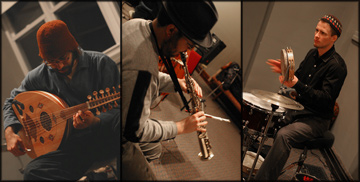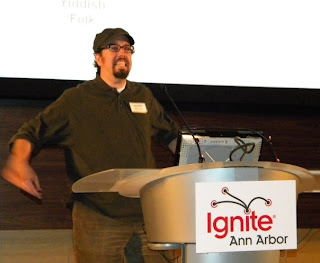I'm going to be giving another Jewish music talk at
Temple Beth Emeth in Ann Arbor in January, this time on Jewish Art Music. I suggested the topic because a) it has a rich and misunderstood history and b) I richly misunderstand it as much as anyone. I know a lot less about Jewish art music than I do about other aspects of Jewish music. This has a bit to do with my taste in music and a bit to do with the challenges in tracking performers and composers in this space. I'll be writing a number of blog posts over the next couple of weeks that touch on Jewish art music, both as a way for me to get my thoughts in order and as a way for people to dope-smack me when I go astray. Which,
I'm sure, will be often has already started.
Let me start by explaining what I mean by
art music. Here's a pretty reasonable starting point, from Wikipedia. * (There is also a Wikipedia article on
Jewish art music but I find it way too narrow.)
"Art music (or serious music or erudite music) is an umbrella term used to refer to musical traditions implying advanced structural and theoretical considerations and a written musical tradition. The notion of art music is a frequent and well defined musicological distinction, e.g. referred to by musicologist Philip Tagg as an "axiomatic triangle consisting of 'folk', 'art' and 'popular' musics." He explains that each of these three is distinguishable from the others according to certain criteria. In this regard, it is frequently used as a contrasting term to popular music and traditional or folk music."
In this sense, according to Tagg, Art music (as opposed to folk and popular music) is characterized by professional musicians, written scores, limited distribution, an agrarian or industrial culture, written musical theories and non-anonymous composers. It's a mouthful but you get the idea. This is fancy stuff, not the anonymous and ubiquitous oral folk tradition or mass-produced & distributed recorded pop stuff. A variety of different musics fit under this heading including orchestral and chamber music, opera, choral, and arguably more challenging versions of (sometimes) jazz and (rarely) rock music.
Thinking about Jewish art music raises a question that exists, but is less interesting, for Jewish folk and pop musics. Why make it at all? There are Jewish folk, who make music, so you get Jewish folk music. There is a Jewish populous and bands that play for them, so you get Jewish pop music. But in the theory-rich and abstracted compositional space of art music..how and why do you end up with Jewish art music?
There seem to be a couple of answers.
First, you don't. There is a long history of extremely talented and famous Jewish musicians, composers, and conductors that have been central to the Art music tradition but did not typically or ever produce recognizably Jewish art music. Some famous examples include Giacomo Meyerbeer, Gustav Mahler and Felix Mendelssohn, minimalist composers Philip Glass and Steve Reich, Leonard Bernstein, and 12-tone composer Arnold Schoenberg. Professionally, it was often not advantageous to advertise their Judaism and musically it was often irrelevant.
(Note I said typically, my buddy Daniel just pointed out that both Reich and Schoenberg have composed Jewish works as well as non-Jewish works. That's also true for Meyerbeer and Bernstein.)Second, you do if the composer is interested in liturgical compositions. Western art music (classical music) traces its history back to Gregorian chants which trace their history back to Jewish liturgical music. Art music and liturgical music have been influencing each other ever since. While there is a sense in traditional Judaism that our liturgical melodies go back to Sinai (and are referred to as "Mi Sinai" melodies), in truth these melodies have evolved and changed over time. In the 19th century, Samuel Naumbourg, Solomon Sulzer and Louis Lewandowski documented Ashkenazi liturgical music and added their own, now ubiquitous compositions. New liturgical works are constantly being developed. Some, such as the works of
Hugo Chaim Adler and Samuel Adler and
Aaron Blumenfeld fit well into the mainstream of Jewish liturgical works as well as art song. Some are quite idiosyncratic. I'm personally a fan of the
Herbie Hancock composed Jon Klien composed, Herbie Hancock performed "Hear O Isreal, a Sabbath Composition in Jazz" which was composed in the mid 1960's as commissioned work for Rabbi David Davis. For a wonderful, focused, exploration of the evolution of Jewish liturgical music, check out Cantor Andrew Bernard's
"A Guide to Kaddish in 16 Tracks."Third, you do if, as a composer, you're interested in the development of national music or cultural identify. There was a fascination in the 19th century, and to a lesser degree the 20th century, in developing cultural and nationalistic identities through the development of identifying cultural art, including music. For example, the "New Jewish School*" of music, represented by the St. Petersburg Society for Jewish Folk Music,
"can be compared to other national currents, forming the European musical landscape since the middle of the 19th century. While Russian, Czech, Spanish or Norwegian national music was able to unfold and establish itself in the cultural conscience, the development of the Jewish school was violently terminated by the Stalinist and national-socialist policy after only three decades.The history of the New Jewish School started in the first decade of the 20th century. In 1908 the Society for Jewish folk music was founded in St. Petersburg - the first Jewish musical institution in Russia. Important composers, such as Joseph Achron, Michail Gnesin, Alexander Krejn , Moshe Milner, Solomon Rosowsky, Lazare Saminsky and others joined it. In contrast to Jewish composers from Western Europe these young artists did not lose their connection to the Jewish community. The more than five million Jews in Russia (at that time about half of the Jews in the world) lived in old traditions, which remained a nurturing soil and a source of inspiration for musicians. [Musica Judaica website]
In the 20th century, outside of Israel, diaspora composers have often substituted the idea of Jewish identity for Jewish nationality but followed the same compositional lines... developing non-liturgical compositions inspired by Jewish religious practice, Jewish events (often the Holocaust), or themes from Jewish folk and/or popular music. Dmitri Shostakovich's Symphony No. 13, for example, was inspired by the poem Babi Yar, by Yevgeni Yevtushenko, which tells the story of a massacre of Jews in Kiev by the Nazi's but is also the story of Russian pogroms and of callous hate. (You can
read the poem at Remember.org, and hear a performance of the poem and the symphony at
the Museum of Jewish Heritage website. Avant-garde Jazz saxophonist and composer John Zorn developed the Masada Songbook of over 200 individual compositions based on a set of composition rules derived, largely, from his analysis of Jewish liturgical and klezmer modes. You can
listen to an NPR spot on the Masada project on the NPR website. To develop an American Jewish identify, the
Milken Archive of Jewish Music has produce well over 50 CDs of American Jewish art music ranging from Yiddish Theater music to contemporary symphonies. My personal favorite so far is
Ofer Ben-Amots' etherial "Celestial Dialogues / Hashkivenu / Shtetl Songs"
By the way...what comes around goes around. Two of my favorite albums are pianist
Uri Caine (and his ensemble) exploring Gustav Mahler from both an improvisational jazz perspective as well as a Jewish music perspective, including klezmer styled horns and vocals by the extraordinary
Cantor Aaron Bensoussan. The studio album,
Primal Light, and the live album
"I Went Out This Morning Over the Countryside: Gustav Mahler in Toblach" don't necessary show that Mahler had Jewish themes, which is questionable, instead they show how good a vehicle Mahler is for improvisation, Jewish themed or otherwise. But the irony, as well as the music, is delightful.
As I noted earlier, keeping up with Jewish art music is difficult. Here are some of my favorite resources, but all have frustratingly narrow focus areas.
1. The Milken Archive of Jewish Music: The American Experience2. John Zorn's Tzadik label (look for the Radical Jewish Culture sub-label)
3.
Jewish-Theatre.com - "The Global Website to promote Jewish Theatre and Performing Arts"
4.
The Jewish Music WebCenter - an online forum for academic, organizational, and individual activities in Jewish music.
5.
American Society for Jewish Music - which "serves as a broad canopy for all who are interested in Jewish music. Its members include cantors, composers, educators, musicologists, ethnologists, historians, performers and interested lay members - as well as libraries, universities, synagogues and other institutions."
6. The
Klezmershack,
Hava Nashira, and
Jewish Shul Music mailing lists. While no one list focuses on Jewish art music, each occasionally has something interesting in this area.
* The Wikipedia article has lots of useful and cluttering footnotes and citations. Check 'em out if you want further edification. The Tagg article "Analysing popular music: theory, method and practice" is particularly fascinating.
 I love meeting interesting folks, and there are no shortage of interesting folks in the Jewish music world. This week I got an email from Samuel Thomas, Ph.D candidate in Ethnomusicology at the City University of New York and the leader of the musical collective Asefa. Asefa plays a wonderfully exploratory fusion of Arabic Jewish music and jazz that includes Yoshie Fructer, guitarist and New York Jewish scene staple, bass player Noah Jarrett, and percussionists Eric Platz and Rich Stein. This is the kind of music, deeply rooted in tradition and wildly adventurous, that I could crawl inside and live in.
I love meeting interesting folks, and there are no shortage of interesting folks in the Jewish music world. This week I got an email from Samuel Thomas, Ph.D candidate in Ethnomusicology at the City University of New York and the leader of the musical collective Asefa. Asefa plays a wonderfully exploratory fusion of Arabic Jewish music and jazz that includes Yoshie Fructer, guitarist and New York Jewish scene staple, bass player Noah Jarrett, and percussionists Eric Platz and Rich Stein. This is the kind of music, deeply rooted in tradition and wildly adventurous, that I could crawl inside and live in.









 "100 Voices"
"100 Voices" 









